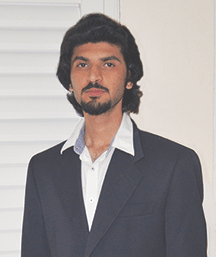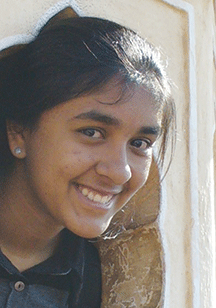 “CIVILIAN DRONES are just a few years away from becoming commonplace,” says high-tech innovator Yashaan Cooper (20).In May, this robotics enthusiast together with Rohit Saluja and Vishank Bhatia — all second year electronics and communications engineering students of the Birla Institute of Technology & Science, Dubai — were shortlisted in the students category to compete in the second round of the three-phase ‘Drones for Good Award’ global competition initiated by the government of United Arab Emirates, with a winners’ prize award of AED 1 million (Rs.1.6 crore).
“CIVILIAN DRONES are just a few years away from becoming commonplace,” says high-tech innovator Yashaan Cooper (20).In May, this robotics enthusiast together with Rohit Saluja and Vishank Bhatia — all second year electronics and communications engineering students of the Birla Institute of Technology & Science, Dubai — were shortlisted in the students category to compete in the second round of the three-phase ‘Drones for Good Award’ global competition initiated by the government of United Arab Emirates, with a winners’ prize award of AED 1 million (Rs.1.6 crore).
The competition challenges participants to design prototypes of unmanned aerial vehicles (UAVs) or remote-controlled drones to deliver civilian services. The finalists will showcase their UAVs at the Government Summit scheduled for February 2015.
The elder of two children of geologist Nari Jimmy and homemaker Binaifer, Yashaan credits his success to his rigorous primary-secondary education in Anand Vidya Vihar, Vadodara, his Parsee lineage and perfectionist mother. “I believe the strict regime I was put through at home and in school coupled with freedom to be creative, has stood me in good stead. I don’t give up easily and stay focussed,” he says.
Top-ranked last year at the International Autonomous Robotics Challenge (IARC), 2013 staged in Dubai, #8 in IARC at IIT-Kanpur 2014, and #4 at the ASME (American Society of Mechanical Engineers)-sponsored Student Design Competition for UAVs for forest fires, team leader Yashaan says: “Our project drone will have an integrated system which will store Google images, operate on artificial intelligence and can be used for navigation, exploration, traffic updates and to deliver parcels. We are currently looking for sponsors to fund our AED 15,000 (Rs.2.45 lakh) project.”
Besides robotics, this young engineer has several other interests. He is an accomplished pianist with certificates of the Trinity College of Music, London, an avid web designer and ethical hacker. He is also the co-founder of Traderse7en Capital Holdings, a risk assessment management company.
In the long term, Yashaan has ambitious plans to combine robotics research with social entrepreneurship. “I’m exploring ways to design an open source robotics development platform which will attract people around the world to contribute to apps development. And some day I hope to design robots to aid disabled human beings,” he enthuses.
Way to go, Bro!
Suverchala Kashyap (Vadodara)
Gayathri Muthukumar
Gayathri muthukumar (17), a class XII student of the National Public School, Indiranagar, Bangalore, is the newly crowned Season Seven champion of the Indian National Brain Bee 2014 — an all-India competition open to class XI students. Launched by the Mumbai-based Seven Hills Hospitals, the objective of this annual competition is to inspire youth to seek careers in basic and clinical neurosciences. Before she became national champion on April 20, Gayathri bested 3,600 entrants from 180 schools in the 240-minute final staged in Mumbai. As this year’s winner she bagged a trophy, laptop, certificate and an all-expenses paid trip to Washington DC, to participate in the 16th International Brain Bee finals scheduled for August 7-10.
“My parents and elder sister, an IIT-Madras graduate, mentored me through the entire process, as all of them are keenly interested in science. I’m also grateful to my teachers for encouraging me to participate and helping me prepare for this unique event,” says this younger of two daughters of Kalyan, principal engineer, Intel India, and Vijaya, a homemaker.
Eminent neurologists including Dr. Susheel Wadhwa of the Narayana Hrudayalaya (Bangalore), Dr. Subhash Kaul, head of department (neurology) at the Nizam’s Institute of Medical Sciences (Hyderabad), and Brig. S.P. Gorthi, professor and head of department (neurology), Army Hospital (New Delhi), adjudged the competition which comprised a quiz, a written brain anatomy test and doctor-patient simulation rounds.
The National Brain Bee has been “excellently designed” to provide exposure to youth interested in the medical sciences. “The biology education we receive in high school is very elementary. The competition goes well beyond school curriculums and stimulates students to explore nuances of the neurosciences,” says Gayathri who’s also a trained classical dancer.
Although a career in biological research/medicine after class XII is a natural progression, Gayatri wants to keep her options open. “Right now I am preparing real hard to make an impact at the International Brain Bee finals in Washington,” she says.
Bon Voyage!
Paromita Sengupta (Bangalore)